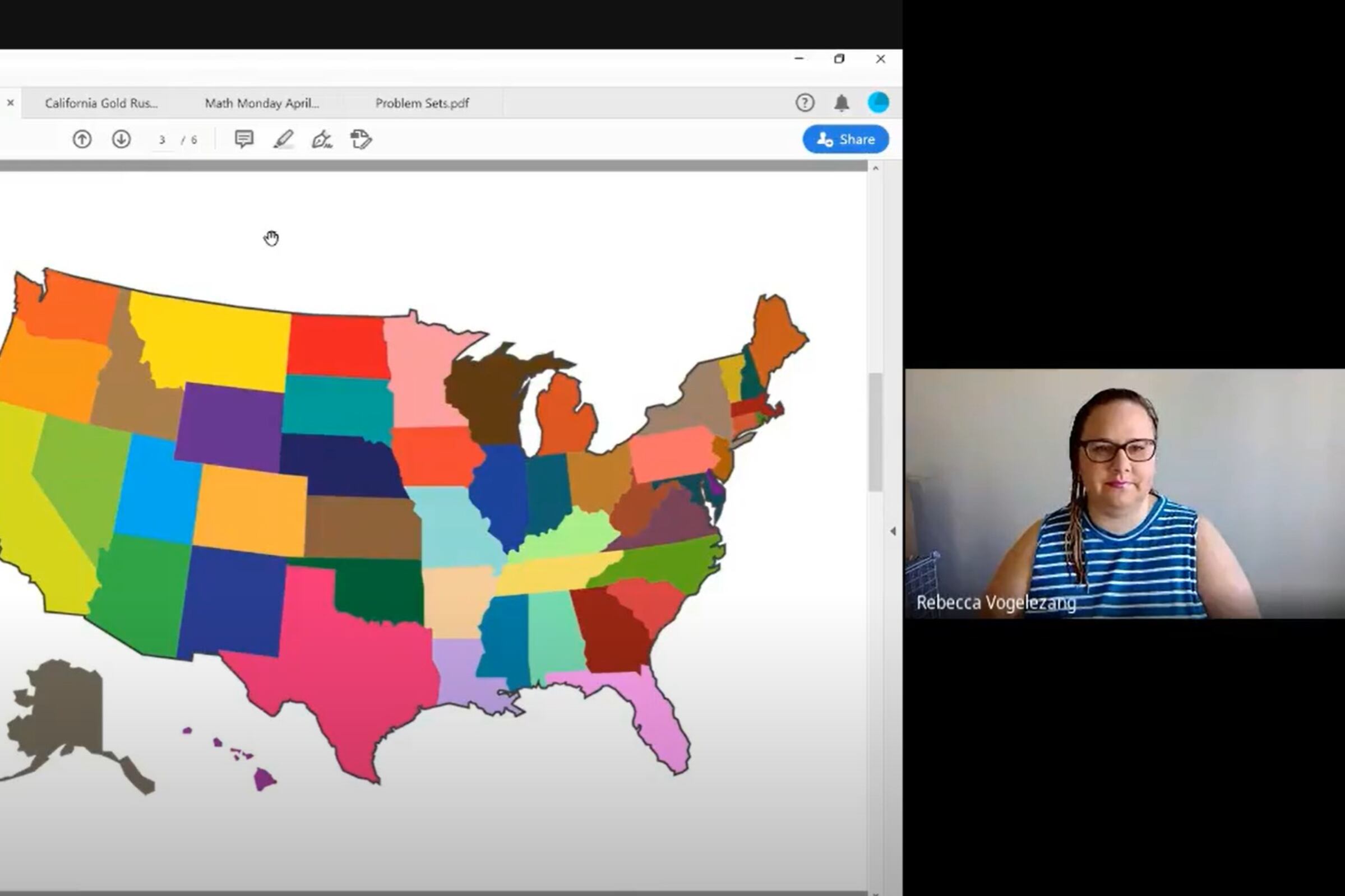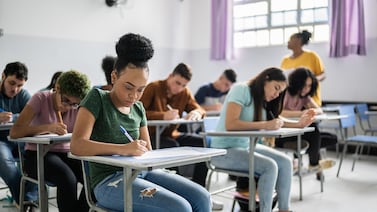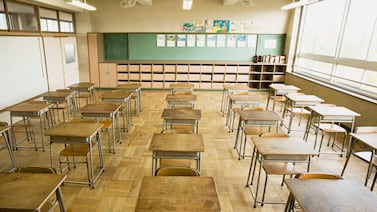The boys on the Detroit Edison Public School Academy basketball team were so close. After cruising to a playoff win on March 11, they were just a few steps away from a state championship.
But one spectator had a feeling that with a pandemic looming, this wasn’t going to be their year — despite the bottles of hand sanitizer placed around the gym.
“I knew that was going to be the last game of the high school season,” recalled Ralph Bland, superintendent of the Detroit charter school network that includes DEPSA. “And I was thinking that we have to mobilize the leadership within the network right now.”
The next day, Gov. Gretchen Whitmer ordered all school buildings closed. Within two weeks, the network lost one of its first parents to the virus — Detroit police captain Jonathan Parnell — as new cases of COVID-19 multiplied across the city. Since then, 50 students who attend schools in the New Paradigm network have had a least one family member fall ill. Classes haven’t been held in New Paradigm’s school buildings in 46 days.
More than a month of feverish planning, constant uncertainty, problem-solving, and grief have made one thing clear to the network’s staff and 2,400 students: There was no planning for this.
Even though New Paradigm reacted quickly, and its roster of schools includes some of the highest academic performers in Detroit, network staff face the same harsh reality as educators across the city and state.
No amount of preparedness will prevent students from losing academic ground. Elementary schoolers at New Paradigm — like their peers across Michigan and the U.S. — will need extra help to be prepared for next year’s concepts. High schoolers will need more support than ever if they’re going to be ready for college.
At the same time, students are struggling to come to grips with a world turned upside down. Many are grieving, having lost loved ones to a virus that has already killed more than 800 people in Detroit, one of the most-affected cities in the country.
“One of the things I often hear is fear,” said Beverly Hall, a social worker with the network. “It’s a fear of not knowing if their world will go back to what it was before.”
The network’s new normal is tracked in a spreadsheet. COVID-related problems across the network, from deaths to a lack of internet access, are added daily by staff across the network of six schools. Hall says she has been sleeping less and making a lot more phone calls than usual as she tries to keep up.
“There’s other needs, but right now the most pressing need is the grief and loss,” she said.
One student lost two family members, so Hall referred her to grief counseling. When she checked back in, three more members of the family had died. The student had lost two grandparents, two aunts, and an uncle.
“It started off at two, and within two weeks it was five,” Hall recalled.
Hall listens, encourages students to dwell on the things they loved about the people they’ve lost. She refers them to grief counselors at Open Arms, a nonprofit that contracts with New Paradigm, and does what she can to comfort them from a distance.
“One student told me she’d cried all night, and being on Google Hangouts I could see that her eyes were swollen,” Hall recalled.
On Friday, March 13, two days before Whitmer first ordered schools to close, every teacher in the New Paradigm Network gathered in the high school cafeteria.
“I remember other teachers near me questioning each other, ‘Do you really think this is going to happen?’” said Darryl Tucker, an eighth-grade English teacher at Detroit Edison Public School Academy.
First on the agenda was contacting every family in the network. Teachers each got a list of about 30 students and started calling. Tucker spoke to parents worried that they couldn’t provide their students with the technology needed for online learning. Others told him that they’d lost jobs and didn’t know how they’d put food on the table.
As teachers reached out to parents, many students struggled to fully absorb what was happening. When school was canceled on Friday, Makiah Shipp, president of the senior class at DEPSA, didn’t think too much of it. She figured they’d be back by Tuesday, when she had arranged for Rep. Rashida Tlaib, a Democrat from Detroit, to speak to the students.
“I didn’t think it was going to affect me at all, to be honest,” she said. “I thought it was going to be one or two days, like snow days.”
Once it was clear that Tlaib’s visit wasn’t going to happen, Shipp turned her attention to the other events of the spring, the prom and graduation ceremonies that she had helped organize, but those were soon canceled too. For a while, Shipp hoped that the district would still hold graduation on the football field — anything to close out her senior year. When administrators nixed that idea, she proposed a drive-through graduation. Now she’s working on a video conference graduation.
“Things didn’t really hit me until recently,” she said. “Emotionally it’s taken a toll.”
In the days after school buildings were closed, the network couldn’t solve every problem, but it had some answers ready. By 11 a.m. on Tuesday, it had begun a meal distribution program that gave families breakfast and lunch for every day of the week. Educators began distributing laptops and Wi-Fi hotspots that had been sitting on carts or in computer labs in the schools.
Jacqueline Dungey, principal of Loving Academy, a K-8 school in the New Paradigm Network, said her school also redirected some federal funds to buy new technology for students who didn’t have it.
The need for technology was too great for the network to cover entirely — across Detroit, an estimated 40% of households lack internet access. About 100 students are still using paper packets to learn, Bland said.
Still, it was clear from the start that learning without classrooms wouldn’t be easy.
The network planned to use a blend of prepackaged online lessons from learning software and video-recorded lessons created by teachers. In addition to creating some lessons, teachers would hold daily video chats to answer students’ questions.
But no one — teachers or families — had had much time to get used to an entirely new system of learning.
“There was a large learning gap in increasing the tech literacy of our families,” Dungey said. “There were late night phone calls if parents were working, teaching them how to log into their students’ emails and log into Google Classroom.”
In the first week of the crisis, just 30% of students logged in regularly. More than 90% of students are now active online in a typical day, though a smaller proportion are completing assignments.
Even for students who had internet access, it took a while to get used to the virtual classroom. A few weeks into the semester, a student sent Charlie Levin, a seventh-grade teacher at Detroit Edison Public School Academy, a string of 10 emailed questions, each one adding a new question or thought, as if he were sending text messages.
“I was like, ‘Okay buddy, we’re going to have to reset with this,’” Levin recalled. “Compose a greeting, make sure you’ve got all your questions, then hit send. Then I can address it.”
Levin was glad for the chance to teach the student what he viewed as an important life skill. But as the crisis wore on, he was painfully aware of the limitations of distance learning.
He recalled a recent video call in which he was trying to help a student understand a text, and it wasn’t going very well. The students seemed less engaged than he would have been if they were sitting together in a classroom.
“There was a certain element of disconnect between us that was really hard, which you realize that as a teacher, so much of the learning process requires people to be together,” Levin recalled. “That was really hard, I couldn’t help this student with this problem.”
That helps explain one of the few certainties of the COVID-19 outbreak: New Paradigm staff agree that student learning will suffer.
In the early days of the crisis, Rebecca Vogelezang, a third-grade teacher at Loving Academy, was tasked with creating a handful of video lessons for third-graders across the network.
She’d made instructional videos for her students before, but this would be much harder. Those earlier videos were aimed at just a handful of kids who were struggling with a particular concept.
Now her audience included dozens of third-graders at different schools, each with different needs and levels of comprehension.
“In class, I can tailor things to specific students,” she said. “I have all my questions for students planned out, I know who I’m calling on in advance. But when you’re teaching via video to hundreds of third-graders, you can’t be that specific, so you have to create these open-ended questions. And you don’t know what they’re saying, you don’t know if they get it or if they don’t. There aren’t as many teacher tools that I can pull out. I can’t give immediate feedback.”
Without a teacher nearby to keep them focused, even the most engaged students are getting much less instruction than usual, said Dungey, the principal at Vogelezang’s school.
Teachers are reporting that when they receive homework — if they do — it’s of lower quality than usual. Dungey says she is working to begin testing students remotely to find out how much they’re missing.
“That’s what’s in the back of my mind,” she said. “What will be the impact for this generation? And are we doing enough?”








